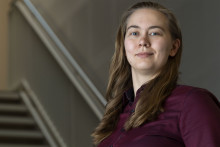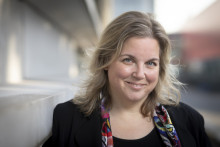What will be the main message of your talk at the conference?
‘I’m not able to answer that yet, but the idea of “work-life balance” is interesting for me, because it is built on a very traditional division between work and private life. However, the different spheres of our life have become much more integrated and completely separating them would be wrong. I’d like the public to reflect on that.’
The conference is dedicated to the topic of ‘academia and work-life balance’. What are the specific challenges academics have to deal with?
‘There is a lot of pressure in academia. It’s especially difficult for young researchers, because they are expected to perform in every way – in research, in teaching, in their free time. That raises many dilemmas and it’s very difficult to gain something even remotely resembling balance. What I’m very critical about is that institutions present this issue as a personal choice, but it is not an individual choice to be balanced. The current post-feminist discourse likes to put all responsibility on the individual, but there are structures in place that make it impossible to choose differently.’
What could be the solution?
‘Part-time work is often presented as a solution, but it is only an easy solution for the organization, it doesn’t work for the employees. It reduces their working hours, but not their workload. Then they often need to do the same amount of work, but in their own time, unpaid. There is a higher demand in every aspect of our lives. It’s the organizations’ responsibility to look at the reality of people today. They need to help their employees to get through the hard times. They should offer longer times for assessments, for example.’
You are an academic yourself, how have you managed to cope with ‘work-life balance’?
‘I generally have an issue with the notion of “balance”, I think it adds an extra burden on people, because they feel that balance is another thing they have to achieve. I don’t look at it as balance. I don’t think of work and private life as two completely different spheres I need to somehow manage. I’m of course not always balanced. There are often many things I can’t organize myself. That is the issue. There is a lot of work we can’t plan or organize on our own, it is therefore not a personal responsibility. Professional organizations should realize that. About one third of all PhD candidates are at risk of psychological problems. That alone shows that it is not an individual issue, but an institutional one.’
About Yvonne benschop
 Yvonne Benschop is Professor of Organizational Behavior at the Radboud University Nijmegen. She is the director of the multidisciplinary research group Gender and Power in Politics and Management. Her research focuses on the functioning of gender and diversity in organizations. She is also Co-Editor in Chief of Organization and Associate Editor of Gender, Work and Organization.
Yvonne Benschop is Professor of Organizational Behavior at the Radboud University Nijmegen. She is the director of the multidisciplinary research group Gender and Power in Politics and Management. Her research focuses on the functioning of gender and diversity in organizations. She is also Co-Editor in Chief of Organization and Associate Editor of Gender, Work and Organization.







